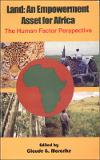| dc.identifier.citation | Mandizadza, E.J.R., Bhatasara, S. and Nyamwanza,O. (2014) Land reform and rural tourism in Zimbabwe. In: Mararike, C.G. (ed.) Land: an empowerment asset for Africa: the human factor perspective. Harare: UZ Publication, pp. 203-223. | en |
| dc.description.abstract | Dynamics and implications of the land reform in Zimbabwe before the year 2000 have been variously examined elsewhere (Moyo, 1986, 1995, 1999,2000; Alexander, 2003, Stoneman 2000, Cliffe, 2000, Mandaza, 1986, Palmer, 1990) and are not the focus of this chapter. It is the Fast Track Land Reform Programme (FTLRP) of the year 2000 which is our focus. According to Wolmer et. al. (2003:1), “since 2000, Zimbabwe’s land reform initiatives have gained a high, and controversial profile internationally”. To Bernstein (2012: 170), "The Fast Track Land Reform Program in Zimbabwe is the world’s most comprehensive state-sponsored redistributive land reform of the twenty first century”. The land reform of2000 was largely the compulsory acquisition and partitioning of large- scale white owned commercial farms and their redistribution to predominantly black small-holder locals. The salience of the land question in Zimbabwe is underlined by the colonial history of land alienation and the armed struggle to reclaim the land. It would seem the main protagonists in the land question are erstwhile colonisers on one end, who would have preferred a minimalist “willing-buyer willing-seller”, “market driven” land reform, eschewing radical change. On the other end is the ZANU PF government, with its nationalist appeal, adopting a Marxist socialist approach in the name of social justice. The contextualisation and rationale of the land reform in Zimbabwe has been variously debated and is not the subject matter of this chapter. | en |


